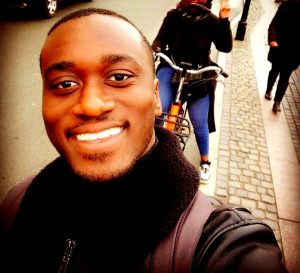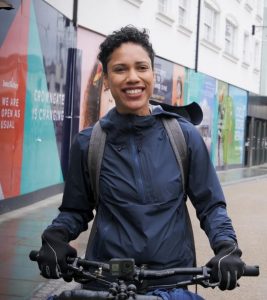An interview with Akwesi Osei, by Dulce Pedroso. Blogpost and show notes by James Stevenson, ATA podcast intern. Podcast audio by Rob Coates, also an intern.
Listen to the podcast episode or download the transcript.
Dulce Pedroso sat down with Akwesi Osei, Transport Planner at climate action charity Possible (and former ATA Equity Fellow) to talk about his recent research paper exploring Black men’s experiences of cycling in London. Akwesi recruited Black men who already cycle at least occasionally and unpacks their own experiences of cycling in the city. From this base, his research explores why there are barriers, what these barriers look like and their interconnections, and how they might be overcome.

Racial profiling of people who cycle in London is a theme within the podcast which comes up several times, highlighting lived experiences of many of Akwesi’s Black male interviewees. The feeling of ‘every time you hear a police siren, you think it’s for you’ led to apprehension and a feeling of un-belonging or being out of place when using a bike in the city. Some interviewees had experienced overt racism from other road users, whereas for others, it was more a case of feeling that anti-cycling road rage could be more aggressive when the victim was a Black man.

Both Dulce and Akwesi discuss their family origins and upbringings within their communities in relation to the current landscape of climate action and cycling. Dulce reflects on her Masters research on cycling, and the potential obstacles for even those comfortable cycling near home might feel when riding out of their neighbourhood, city, or county, into a new place where a Person of Colour might be made to feel like an outsider.
Akwesi offers some possible solutions while also highlighting the need for systematic change beyond the world of cycling. His concept of a ‘Black cycling eco-system’ as voiced by some interviewees reflects the idea that Black people could embed cycling within Black-led spaces, rather than expecting Black people to come to cycling via White spaces.
Dulce Pedroso – Presenter
Dulce Pedroso currently a part-time PhD researcher at the ATA, and was previously an Active Travel Academy Equity Fellow, obtaining a small grant to assist with researching experiences of cycling among Women of Colour. She travelled to different parts of the country to ride with and talk with nine women who all identify as a Woman of Colour and, for whom cycling is a big part of their lives. This has led to a research paper also recently published which uses bell hook’s concept of the ‘oppositional gaze’ to explore how interviewees navigate and use discourses and counter-discourses of cycling and cyclists.
Akwesi Osei – Guest
Akwesi Osei is a transport planner with climate action charity Possible (formerly 10:10). He was previously a Sustainable Transport Planner working on the London Walking and Cycling Conference as well as Green Screening projects for Schools. Prior to that he was a Neighbourhood planner working on Housing Needs Assessments. Akwesi holds a Masters degree in City and Transport Planning, and received a grant from Active Travel Academy to conduct this research.
Links:
Possible: https://www.wearepossible.org/
Black Unity Cycle Ride: https://blackunitybikeride.com/
Adonia Lugo: https://critical-sustainabilities.ucsc.edu/adonia-lugo/
- School Streets: ATA podcast 2024:2 - July 1, 2024
- Accessibility and Urban Design: ATA podcast 2024:1 - January 25, 2024
- Queering Cartographic Methods: ATA podcast 2023:4 - July 6, 2023
[…] 2023. Active Travel Academy » Barriers to Black men cycling in London: ATA Podcast 2023:3 (westminster.ac…, also Osei and Aldred, “You always think about what other people be thinking”: Black men and […]